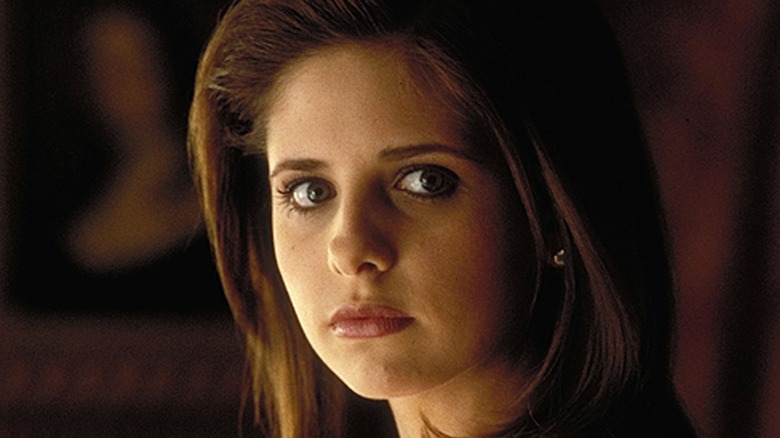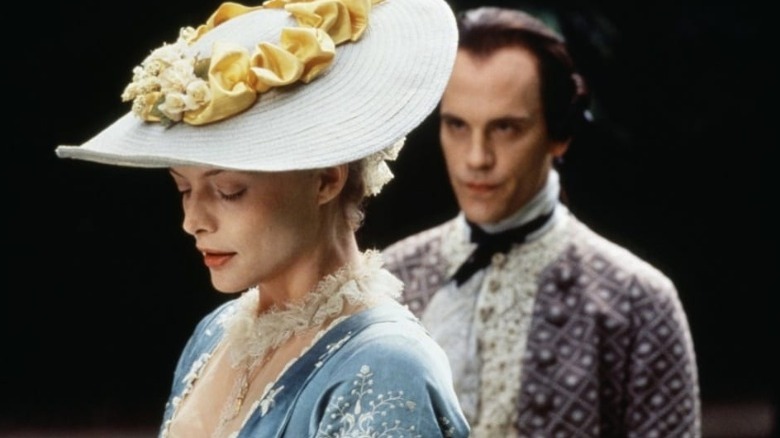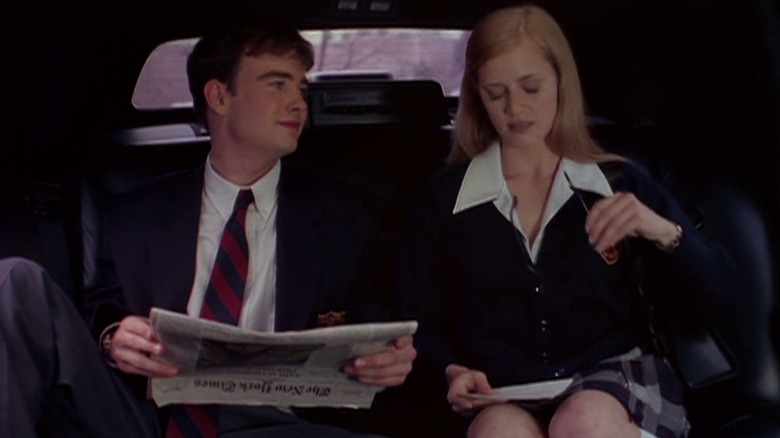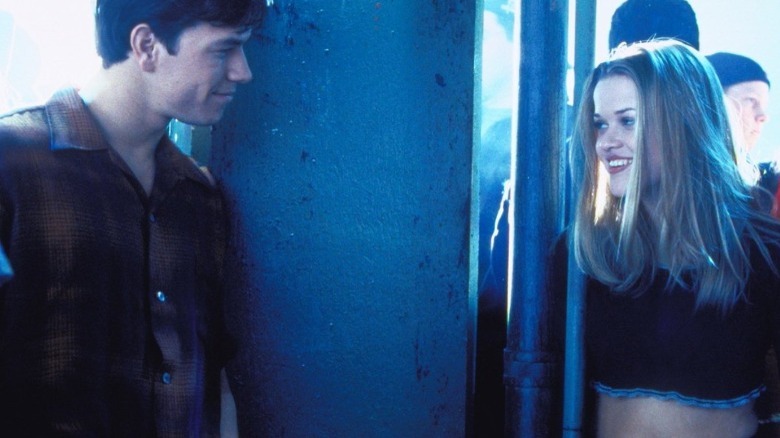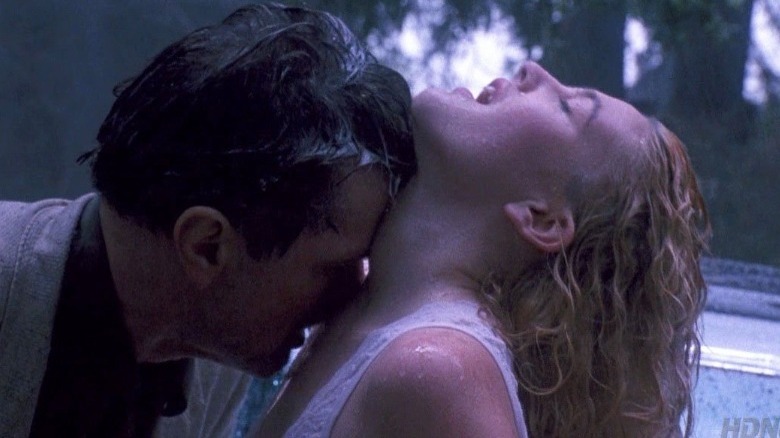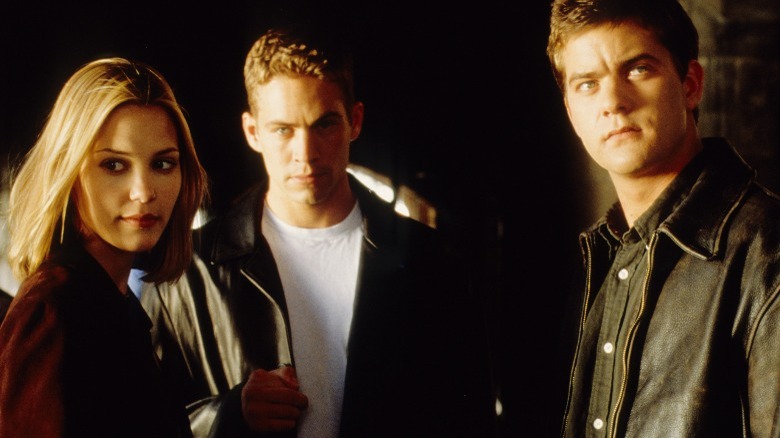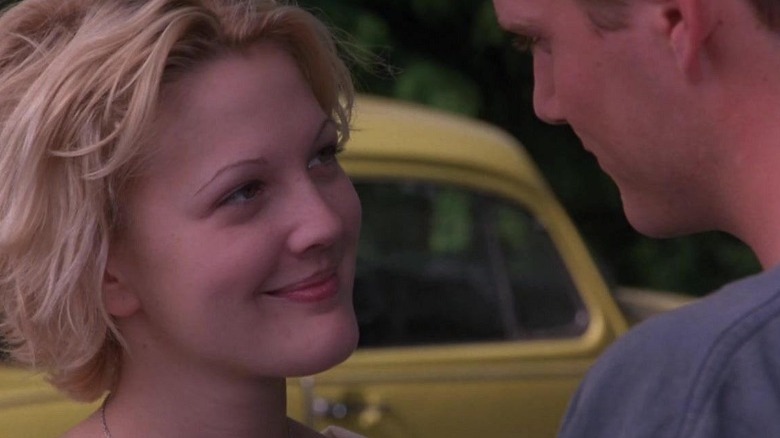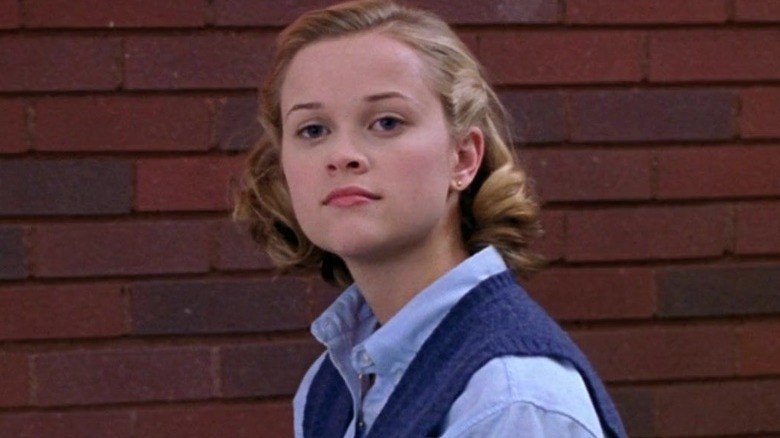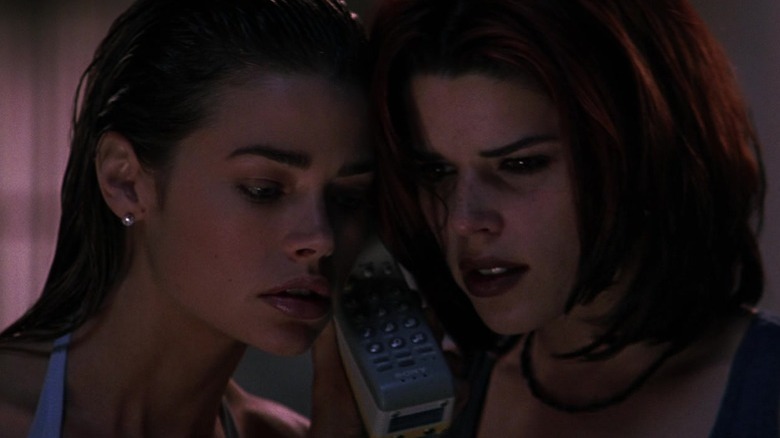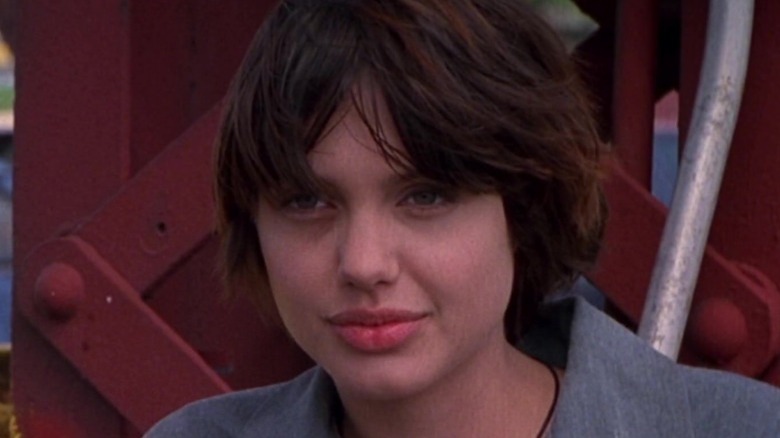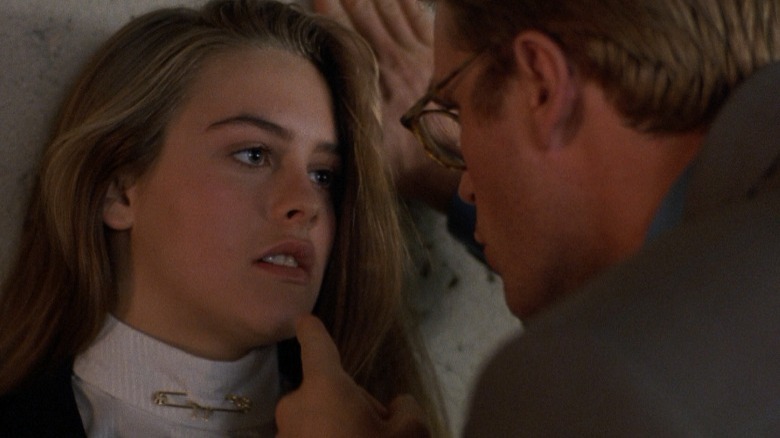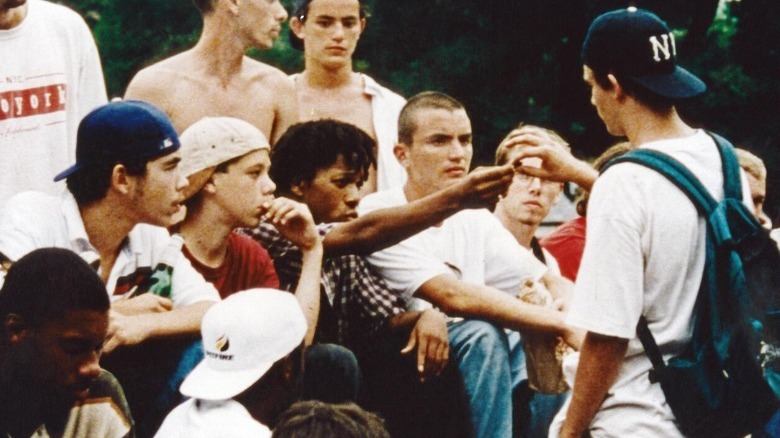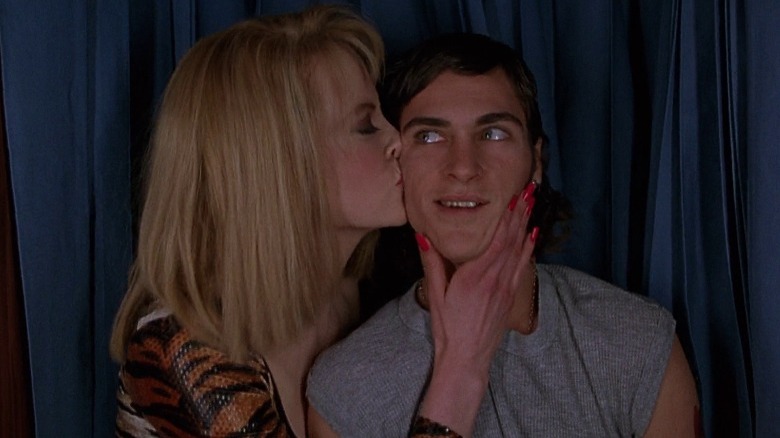12 Movies Like Cruel Intentions That Are Definitely Worth Watching
"Cruel Intentions" celebrated its 20th anniversary a few years ago. I attended a screening and was surprised by the variety of people in attendance. I was expecting people like me, who'd seen the film when they were younger and remembered it as something fun, a little trashy, and a time capsule of the late '90s. The theater was about three-quarters full, and the audience was made up of people of all ages. Older, younger, everything.
Upon my rewatch, I realized how much I underestimated the film; "Cruel Intentions" is a gutsy and strange movie, a tale of scandal and intrigue that features a pair of pretty despicable leads and a depressing (if moralistic) ending. It also has a cast of some of the most lascivious teens caught on camera. "Cruel Intentions" was released during a time where these sorts of stories were possible. It's a movie that I can't imagine getting made today.
More than a great movie, "Cruel Intentions" was a cultural moment — it spawned one of the leading celebrity relationships of the time and depicted a hero of the '90s as a sex and drug addict. There is no equivalent to it, but there are a variety of releases that share some of its DNA. These '90s movies are riffs on the erotic thriller, all attempting to somehow recapture the magic — and box office success — of "Fatal Attraction," yet still trying to do their own thing. They're companion movies, featuring young casts and some very bad people.
Dangerous Liaisons
Starring Glenn Close, a big name in the erotic thriller genre, "Dangerous Liaisons" is most definitely not a teen film. It's a period piece, based on a play and novel of the same name, which served as the inspiration for "Cruel Intentions." This film is set in Paris in the 18th century, and follows the Marquise de Merteuil (Close) and the Vicomte de Valmont (John Malkovich) as they ruin the lives of those who surround them. Like "Cruel Intentions," the story takes a turn when real feelings get involved, and when the game stops being fun.
Directed by Stephen Frears and rounded out by cast members Keanu Reeves, Uma Thurman, and Michelle Pfeiffer, "Dangerous Liaisons" is romantic and a little bit evil, completely entrancing in its actors' willingness to have fun in their beautiful period outfits. The bits and pieces that felt out of place in "Cruel Intentions" fit perfectly in a pre-revolution Paris, and are made all the better when brought to life by performers like Close and Malkovich.
Cruel Intentions 2
"Cruel Intentions 2" is a pretty terrible movie, but don't let that stop you from watching Amy Adams' take on Kathryn Merteuil. Released a year after the original film's debut and trying to ride on the wave of its success, "Cruel Intentions 2" is a prequel that slightly revises the story, following younger iterations of Kathryn (Adams) and Sebastian (Robin Dunne) as they become the terrible people we meet in the original film.
"Cruel Intentions 2" is all about Kathryn and Sebastian's relationship, which is built as if it's a romantic comedy, except with way more sex scenes and cheesy dialogue thrown in the mix. Sebastian is rewritten to be kind of a shy guy, corrupted by Kathryn once he enters her orbit, and is dazzled by the rich and depraved world of Manhattan. It's not a great origin story, but who says a movie has to be good to be enjoyable? Again, it stars Amy Adams!
Fear
Released in 1996 and perfecting Reese Witherspoon's early good girl persona, "Fear" tells the story of Nicole (Witherspoon) and how her life is disrupted when she meets the mysterious David (Mark Wahlberg), a handsome and attentive boy who turns out to be completely unhinged. What starts off as a story about a girl moving into a new town and meeting her dream guy quickly devolves into a stalker story, filled with concerned parents and friends, some scary twists, and murder.
Unlike "Cruel Intentions," "Fear" takes its plot very seriously, which can lead to some accidentally hilarious moments. It also suffers from some very dated politics and cheesy dialogue. Still, it's a seminal entry into the teen erotic thriller genre (a term we just coined), which are sadly in very short supply. It's also an important part of Wahlberg's and Witherspoon's early careers. Finally, "Fear" features Alyssa Milano as the complicated best friend, as well one of the best and wildest sex scenes I can think of — it's set on a roller coaster, to the beat of the Sundays' "Wild Horses."
Poison Ivy
While her name has yet to appear on this list, Drew Barrymore is an important actress for these types of movies, perhaps kicking it all off with "Poison Ivy." Released in 1992, when the genre was just starting to take hold, director Katt Shea approached the film as a teenage take on "Fatal Attraction." The story follows Sylvie (Sara Gilbert), a girl with money and no friends, who quickly befriends the enigmatic Ivy (a perfectly-cast Drew Barrymore, going through her wild-child years), who, having no family and no ties, moves into her home. Ivy grows close to Sylvie's parents and starts to infiltrate her life, seducing Sylvie's father and slowly driving Sylvie's mother insane.
The film has many twists and turns, some of which might strain your patience, but Barrymore is captivating, launching a franchise that blossomed into a four-movie series (although Barrymore only appeared in the first installment). Like many films on this list, "Poison Ivy" has the required girl-on-girl make-out scene, some questionable politics, and really great hair. It was also nominated for the Grand Jury Prize at the Sundance Film Festival and developed a substantial following that remains influential to this day. It's wild fun.
The Skulls
While "The Skulls" is not as focused on horny teenagers as the rest of these films, it's very concerned with privilege and money, something that it shares with "Cruel Intentions." "The Skulls" follows Luke (Joshua Jackson), a newly admitted student at Yale University, who's considered an outsider because he doesn't come from a wealthy family. He's thrilled once he's invited to join the secret society known as the Skulls, a group of wealthy and privileged people that quickly turns out to be more than what Luke bargained for.
Co-starring Paul Walker, Christopher McDonald, and Craig T. Nelson, "The Skulls" is an undeniably dated movie, the type of thriller that no longer gets made and that is overtly serious when the source material doesn't require it, but its focus on teen concerns and the power of money make it into a fitting follow up to "Cruel Intentions." It's a pair of films that make for an interesting double feature, delving into similar waters with very different tones.
Mad Love
Again, the '90s were like the Wild West for teen stories; there's a little bit of everything. Just look at "Mad Love," which stars Drew Barrymore as a girl with borderline personality disorder: It's tonally very different from most of these films, and while it's primarily a love story, it has some comedy, and plenty of drama. The film follows Matt (Chris O'Donnell) and Casey (Barrymore), and the many ups and downs of their relationship. Casey wreaks havoc, sets off fire alarms, gets institutionalized, and runs away, all with the support from Matt, who's hopelessly in love with her.
While the overall tone of the film is light, "Mad Love" goes to some dark places, and retains the flair for drama that we see in the majority of these films; the endings aren't happy, and the characters are heavily damaged, especially the women. As tends to happen in this kind of movie, there's a lesson to be learned at the end, but the trauma that these characters endure remain.
Election
Reese Witherspoon has always done interesting work, but she came into herself with "Election." As Tracy Flick, Witherspoon epitomizes the type-A character, a model that's been replicated with lesser skill in all sorts of TV shows and movies. Tracy is conniving and annoying, yet still incredibly fragile. It's a role that's informed almost everything that Witherspoon has done since — she pushed the character in a hilarious and sweet direction for "Legally Blonde," and reinvented it as a gossipy but harmless housewife in "Big Little Lies." It's also something of a trick: Witherspoon plays with both our perceptions and her established on-screen persona, which makes it jarring when Tracy lets her inner madness out.
"Election" follows Jim (Matthew Broderick), a high-school teacher who gets way too involved in the school election. When Jim sees that Tracy Flick (Witherspoon), his annoying student whom he won't admit he hates, has a chance to become class president, he enlists the popular but dumb jock Paul (Chris Klein) to run against her, setting off a chain of events that shows that the worst person involved in all of this is the adult who got dragged into this mess in the first place. "Election" is one of the best films on this list, a hilarious comedy that contrasts adults with teens and that highlights, without being didactic, the responsibility that the former owes the latter.
Wild Things
"Wild Things," mostly known for featuring a topless Denise Richards, is often called trash. I'm here to say that it's not. Released in 1998, it's a film that drips with a neo-noir mood, set in the Everglades to the beat of a swoony score and featuring an endless stream of double-crossing characters.
While more concerned with the lives of adults than "Cruel Intentions," the two teens at the center of the film, Suzie Toller (Neve Campbell) and Kelly Lanier Van Ryan (Denise Richards), are everything but forgettable. They also make out, checking off one of the teen erotic thriller requirements. "Wild Things" pushed the boundaries of mainstream Hollywood and features one of the most famous sex scenes ever made — to this day, it's still referenced in other pieces of pop culture.
A brief plot breakdown that gives nothing away: Sam Lombardo (Matt Dillon), a handsome and popular teacher, ignores the attention of his gorgeous student Kelly and is accused of rape. Shortly after, he is accused of rape by another student, outsider Suzie. Yeah, it's a story that navigates tricky waters, and while I can't say that it does so sensibly or successfully, it's incredibly cinematic and fun.
Foxfire
With the talent that's involved, it's surprising how little "Foxfire" is known. Starring Angelina Jolie, former child star and co-founder of the band Rilo Kiley Jenny Lewis, Jenny Shimizu, and Peter Facinelli, "Foxfire" is a coming-of-age story. Unlike the majority of coming-of-age films in Hollywood, "Foxfire" doesn't follow a male character. It's wholly concerned with the girls themselves. The film follows the rise and fall of Foxfire, a girl gang formed after the sudden appearance of the brooding and wise Legs (Angelina Jolie).
"Foxfire" is not a great film, but it is a coming-of-age story led by young girls. For a genre that's been around forever, a female touch still feels sadly novel. It tackles topics like friendship and sexual assault, and captures the allure of Angelina Jolie exceptionally well — there's a reason why, for many years, she played the mysterious girl who kicked plots into motion, or added a much-needed jolt to a variety of stories.
The Crush
For a time, Hollywood was obsessed with Alicia Silverstone. Her youthful looks and persona made her perfect for films like "The Babysitter" and "The Crush," which are both concerned with older men who prey on her characters. Neither are very good, but "The Crush" is worth watching, serving as both a time capsule of the period and as an insightful snapshot of how Silverstone was regarded during the '90s.
Like most films focused on young women who become obsessed with older men, "The Crush" follows the handsome Nick (Cary Ewles) as he moves to a new town, and then tries his best to resist young Adrien's (Silverstone) advances. So, basically, it's the type of movie that's written by a guy who didn't really understand the underlying message of "Lolita."
Shot in the style of an erotic thriller, "The Crush" is oftentimes laughable; Silverstone was 15 at the time and looks even younger, kind of ruining Adrien's scary aura. Still, she does good work, and the film makes for an impressive screen debut. Most importantly, "The Crush" presents more evidence that people in the '90s were terrified of young women who were interested in sex.
Kids
"Cruel Intentions" is for babies compared to "Kids." Released in 1995 and launching the careers of an unbelievable group of actors and filmmakers, including Harmony Korine, Rosario Dawson, Chloe Sevigny, Leo Fitzpatrick, and more, it's a film that pushed the boundaries of what could and couldn't be said about teens on screen. "Kids" follows a group of young people in New York, focusing on outrageous and unsanitized stories that put sex and drugs at the forefront. Part of the shock of "Kids" is the fact that the characters look like actual teenagers, not the Hollywood "teens" we're used to seeing, who are often played by actors in their 20s.
"Kids" and "Cruel Intentions" aren't movies that are usually paired, with "Kids" being a more realistic look at the world and "Cruel Intentions" representing something much pulpier and stylized. Still, both films share a fearlessness in depicting the stressful situations that teens often find themselves immersed in, and how exposed they are to danger.
To Die For
Like "Cruel Intentions," "To Die For" is a black comedy. Unlike "Cruel Intentions," "To Die For" wasn't targeted at any specific demographic and features some important adult characters, meaning that it has no need to settle for any kind of moralistic ending.
Based on a true story, "To Die For" follows Suzanne Stone (Nicole Kidman, in one of her best roles) and her journey towards becoming a journalist and appearing on TV, her lifelong dream. Suzanne marries, seduces teens, and plots murders all in service of that goal, which, of course, backfires. Like most of the films on this list, "To Die For" is filled with twists, turns, and intrigue, driven by backstabbing characters who'll do anything to get what they want.
"To Die For" is also special for the way in which it uses a variety of visual techniques to make for a more engaging and fulfilling ride, having the feel of a high-end mockumentary. Nicole Kidman's Suzanne is one of the best villains I can think of, a character who is wily, unpredictable, and wholly entertaining. Like almost all of these films, "To Die For" is a showcase for unrepentant women and how fun they are to watch on screen.
